Philosophical Frameworks for Resolving Ethical Dilemmas in Business
VerifiedAdded on 2023/06/11
|8
|1755
|103
Essay
AI Summary
This essay explores ethical dilemmas faced by businesses, particularly focusing on the case of an online tutoring firm, Tutoring University. It examines the conflict between prioritizing education versus maximizing profit and retaining core values versus winning in a competitive market. The role of a code of conduct in navigating these dilemmas is discussed, highlighting fundamental issues like integrity and trust, as well as compliance and governance. The essay then applies ethical theories of Rand, Kant, and Bentham to analyze potential solutions, assessing the appropriateness of each theory in resolving the identified ethical issues. Ultimately, the essay concludes that theories of Bentham and Rand offer more practical approaches for Tutorial University to address its ethical challenges, emphasizing the importance of considering various factors beyond mere morality when making business decisions. Desklib provides access to past papers and solved assignments to aid students in similar analyses.
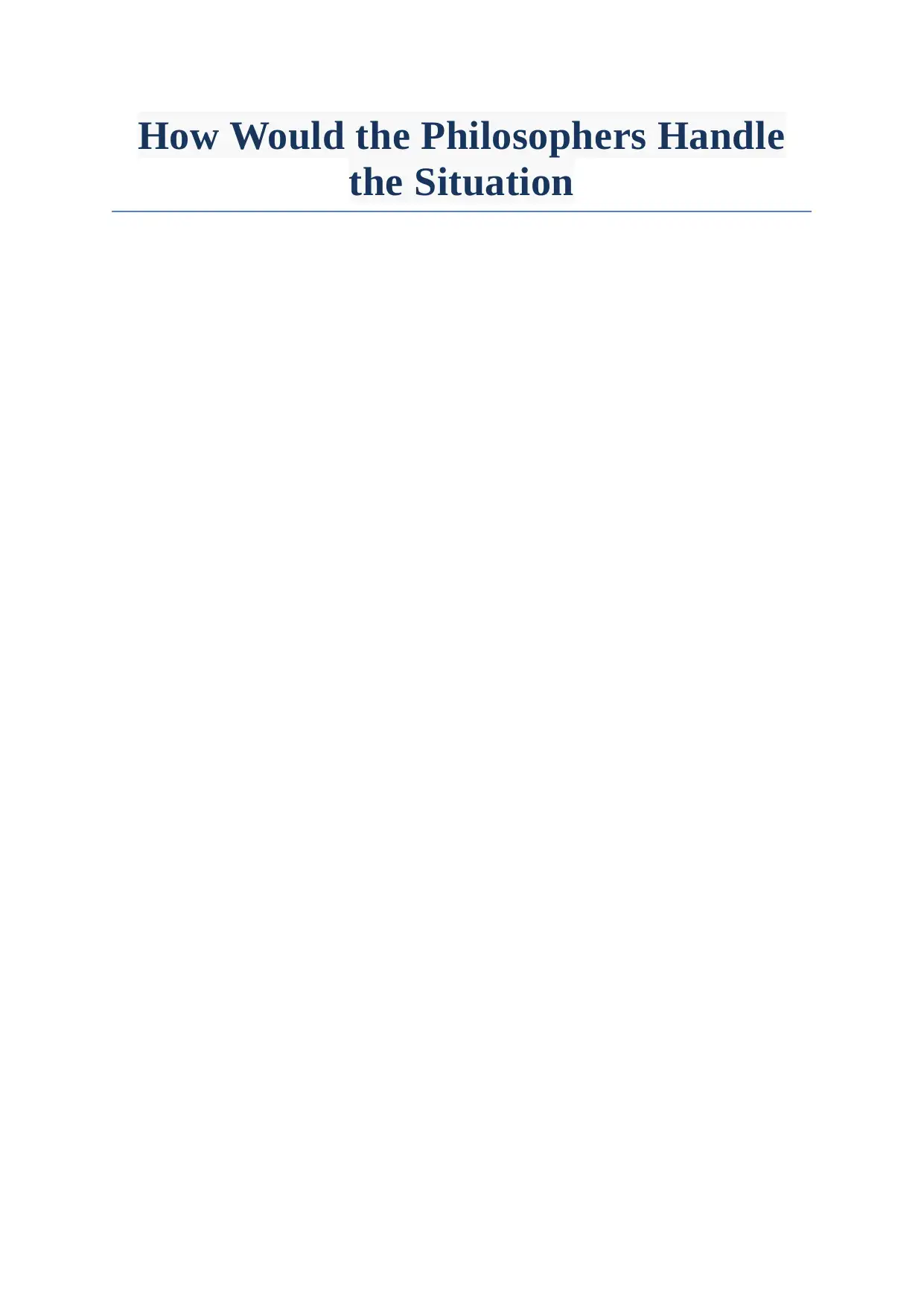
How Would the Philosophers Handle
the Situation
the Situation
Paraphrase This Document
Need a fresh take? Get an instant paraphrase of this document with our AI Paraphraser
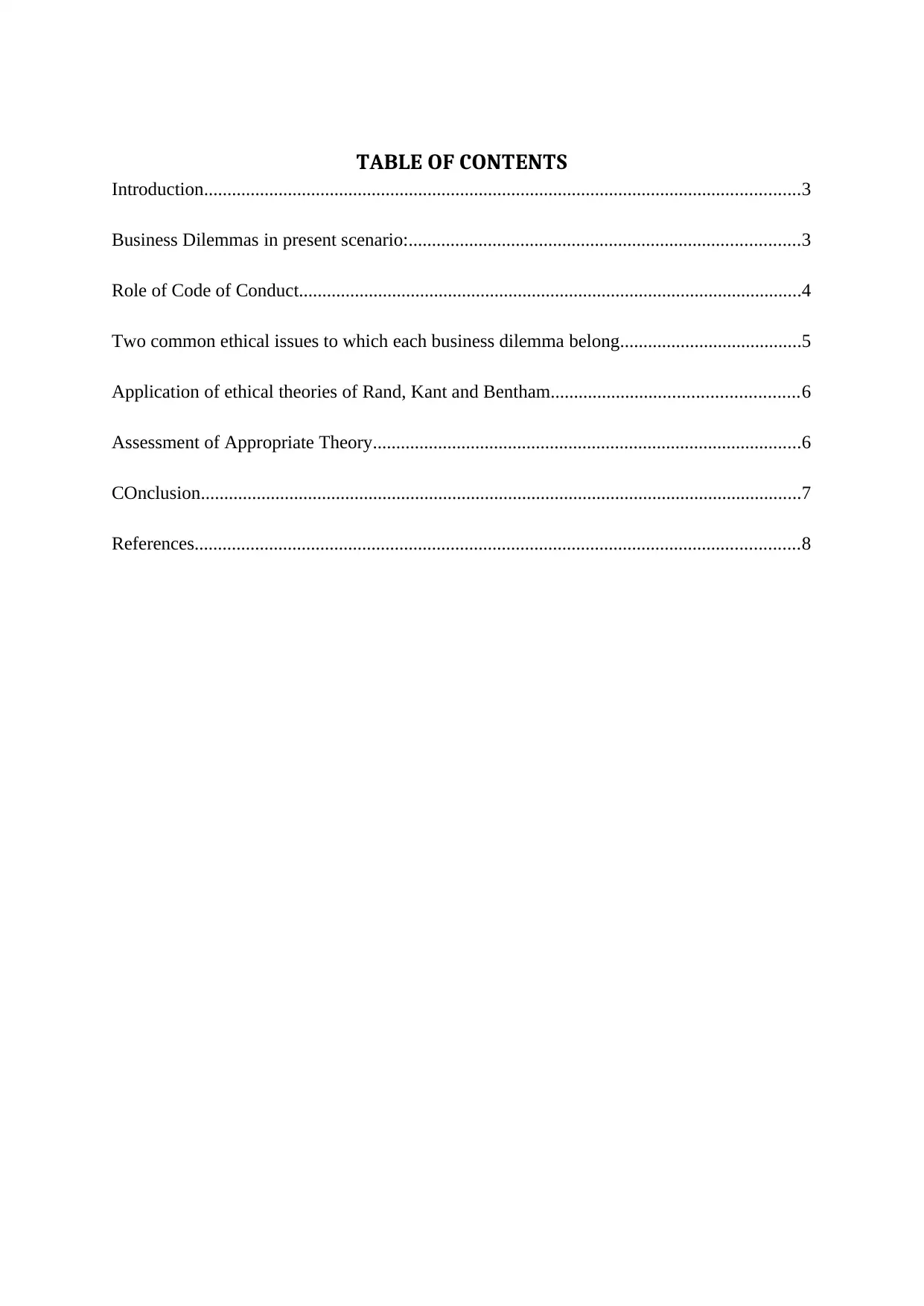
TABLE OF CONTENTS
Introduction................................................................................................................................3
Business Dilemmas in present scenario:....................................................................................3
Role of Code of Conduct............................................................................................................4
Two common ethical issues to which each business dilemma belong.......................................5
Application of ethical theories of Rand, Kant and Bentham.....................................................6
Assessment of Appropriate Theory............................................................................................6
COnclusion.................................................................................................................................7
References..................................................................................................................................8
Introduction................................................................................................................................3
Business Dilemmas in present scenario:....................................................................................3
Role of Code of Conduct............................................................................................................4
Two common ethical issues to which each business dilemma belong.......................................5
Application of ethical theories of Rand, Kant and Bentham.....................................................6
Assessment of Appropriate Theory............................................................................................6
COnclusion.................................................................................................................................7
References..................................................................................................................................8
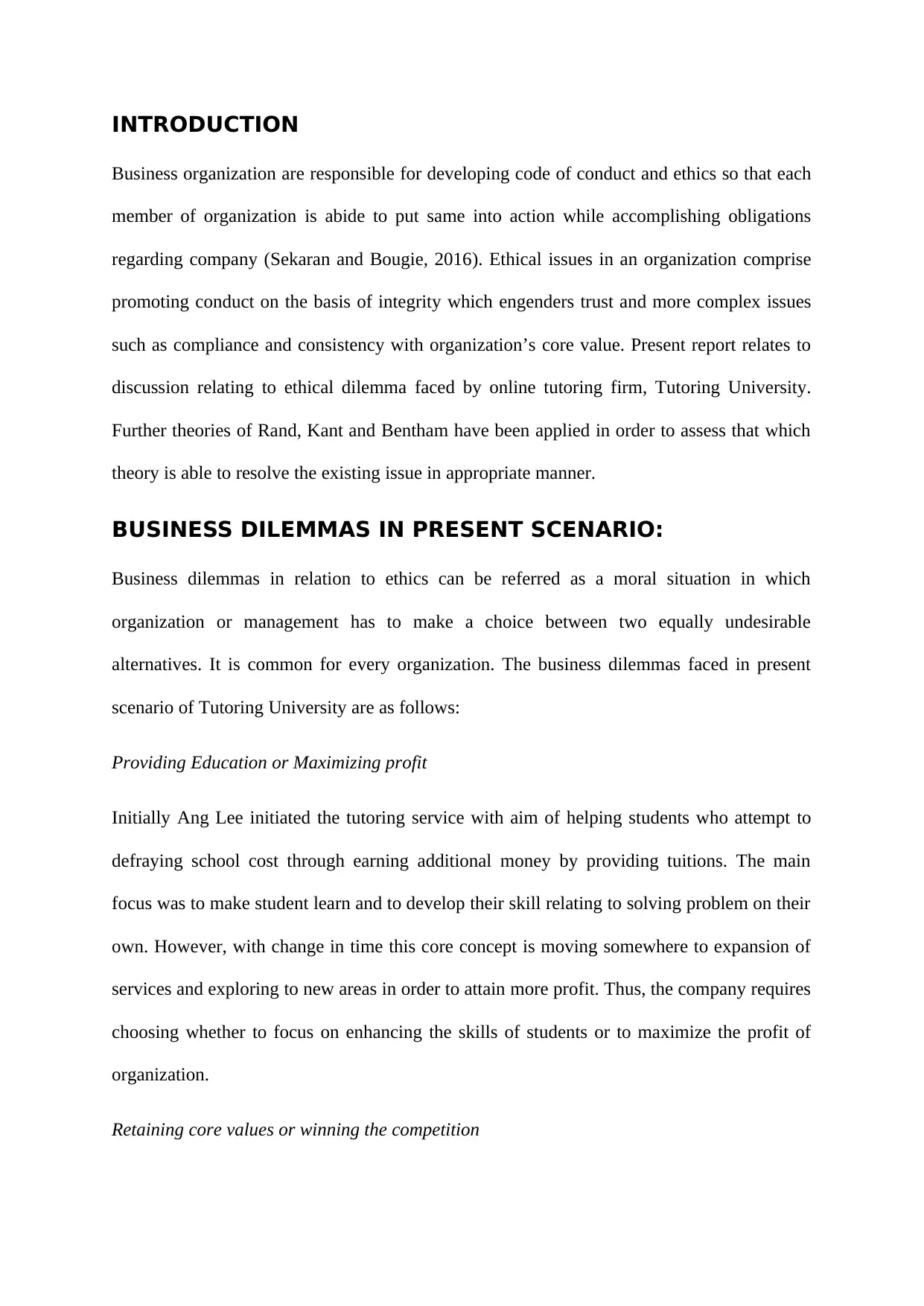
INTRODUCTION
Business organization are responsible for developing code of conduct and ethics so that each
member of organization is abide to put same into action while accomplishing obligations
regarding company (Sekaran and Bougie, 2016). Ethical issues in an organization comprise
promoting conduct on the basis of integrity which engenders trust and more complex issues
such as compliance and consistency with organization’s core value. Present report relates to
discussion relating to ethical dilemma faced by online tutoring firm, Tutoring University.
Further theories of Rand, Kant and Bentham have been applied in order to assess that which
theory is able to resolve the existing issue in appropriate manner.
BUSINESS DILEMMAS IN PRESENT SCENARIO:
Business dilemmas in relation to ethics can be referred as a moral situation in which
organization or management has to make a choice between two equally undesirable
alternatives. It is common for every organization. The business dilemmas faced in present
scenario of Tutoring University are as follows:
Providing Education or Maximizing profit
Initially Ang Lee initiated the tutoring service with aim of helping students who attempt to
defraying school cost through earning additional money by providing tuitions. The main
focus was to make student learn and to develop their skill relating to solving problem on their
own. However, with change in time this core concept is moving somewhere to expansion of
services and exploring to new areas in order to attain more profit. Thus, the company requires
choosing whether to focus on enhancing the skills of students or to maximize the profit of
organization.
Retaining core values or winning the competition
Business organization are responsible for developing code of conduct and ethics so that each
member of organization is abide to put same into action while accomplishing obligations
regarding company (Sekaran and Bougie, 2016). Ethical issues in an organization comprise
promoting conduct on the basis of integrity which engenders trust and more complex issues
such as compliance and consistency with organization’s core value. Present report relates to
discussion relating to ethical dilemma faced by online tutoring firm, Tutoring University.
Further theories of Rand, Kant and Bentham have been applied in order to assess that which
theory is able to resolve the existing issue in appropriate manner.
BUSINESS DILEMMAS IN PRESENT SCENARIO:
Business dilemmas in relation to ethics can be referred as a moral situation in which
organization or management has to make a choice between two equally undesirable
alternatives. It is common for every organization. The business dilemmas faced in present
scenario of Tutoring University are as follows:
Providing Education or Maximizing profit
Initially Ang Lee initiated the tutoring service with aim of helping students who attempt to
defraying school cost through earning additional money by providing tuitions. The main
focus was to make student learn and to develop their skill relating to solving problem on their
own. However, with change in time this core concept is moving somewhere to expansion of
services and exploring to new areas in order to attain more profit. Thus, the company requires
choosing whether to focus on enhancing the skills of students or to maximize the profit of
organization.
Retaining core values or winning the competition
⊘ This is a preview!⊘
Do you want full access?
Subscribe today to unlock all pages.

Trusted by 1+ million students worldwide
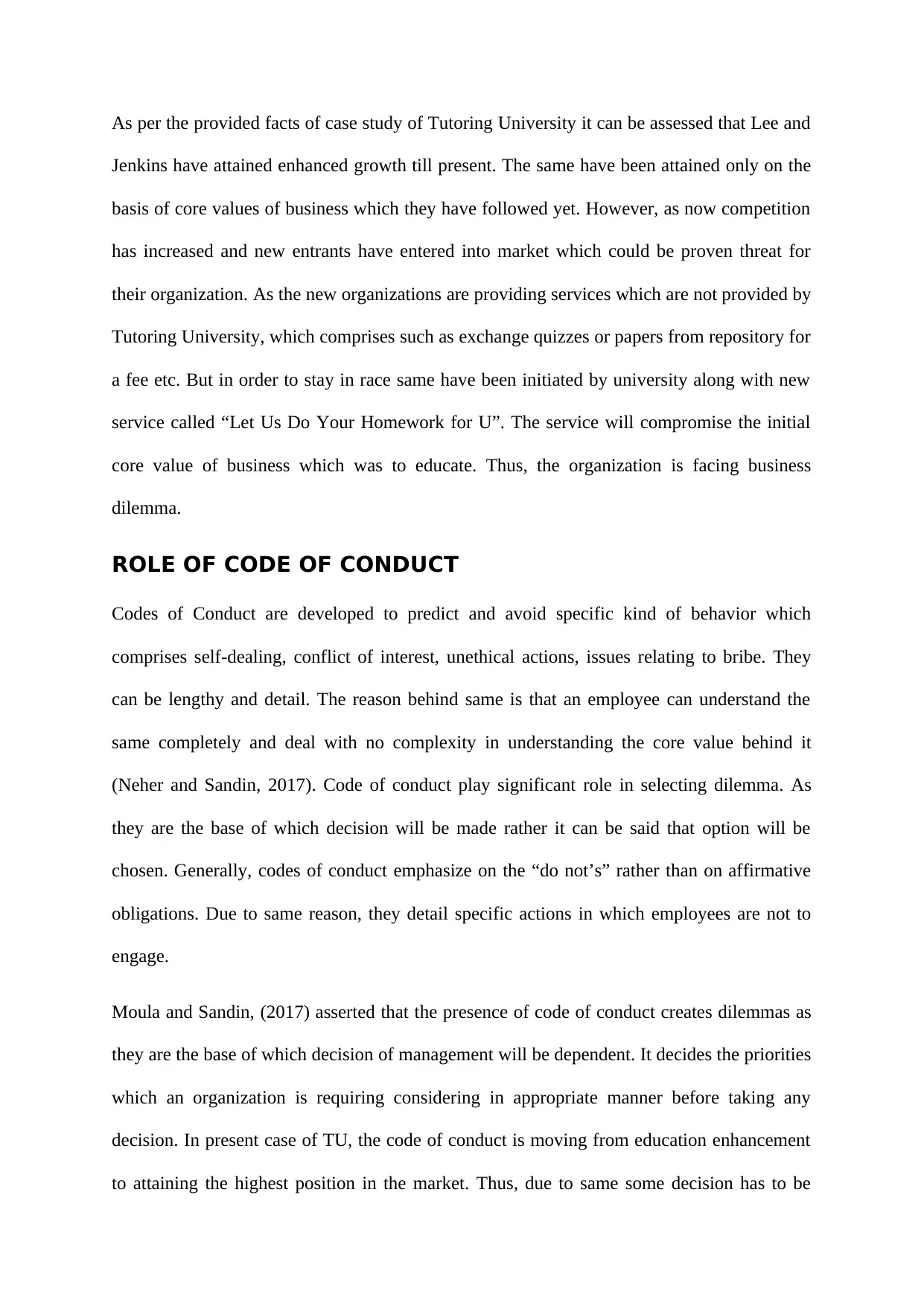
As per the provided facts of case study of Tutoring University it can be assessed that Lee and
Jenkins have attained enhanced growth till present. The same have been attained only on the
basis of core values of business which they have followed yet. However, as now competition
has increased and new entrants have entered into market which could be proven threat for
their organization. As the new organizations are providing services which are not provided by
Tutoring University, which comprises such as exchange quizzes or papers from repository for
a fee etc. But in order to stay in race same have been initiated by university along with new
service called “Let Us Do Your Homework for U”. The service will compromise the initial
core value of business which was to educate. Thus, the organization is facing business
dilemma.
ROLE OF CODE OF CONDUCT
Codes of Conduct are developed to predict and avoid specific kind of behavior which
comprises self-dealing, conflict of interest, unethical actions, issues relating to bribe. They
can be lengthy and detail. The reason behind same is that an employee can understand the
same completely and deal with no complexity in understanding the core value behind it
(Neher and Sandin, 2017). Code of conduct play significant role in selecting dilemma. As
they are the base of which decision will be made rather it can be said that option will be
chosen. Generally, codes of conduct emphasize on the “do not’s” rather than on affirmative
obligations. Due to same reason, they detail specific actions in which employees are not to
engage.
Moula and Sandin, (2017) asserted that the presence of code of conduct creates dilemmas as
they are the base of which decision of management will be dependent. It decides the priorities
which an organization is requiring considering in appropriate manner before taking any
decision. In present case of TU, the code of conduct is moving from education enhancement
to attaining the highest position in the market. Thus, due to same some decision has to be
Jenkins have attained enhanced growth till present. The same have been attained only on the
basis of core values of business which they have followed yet. However, as now competition
has increased and new entrants have entered into market which could be proven threat for
their organization. As the new organizations are providing services which are not provided by
Tutoring University, which comprises such as exchange quizzes or papers from repository for
a fee etc. But in order to stay in race same have been initiated by university along with new
service called “Let Us Do Your Homework for U”. The service will compromise the initial
core value of business which was to educate. Thus, the organization is facing business
dilemma.
ROLE OF CODE OF CONDUCT
Codes of Conduct are developed to predict and avoid specific kind of behavior which
comprises self-dealing, conflict of interest, unethical actions, issues relating to bribe. They
can be lengthy and detail. The reason behind same is that an employee can understand the
same completely and deal with no complexity in understanding the core value behind it
(Neher and Sandin, 2017). Code of conduct play significant role in selecting dilemma. As
they are the base of which decision will be made rather it can be said that option will be
chosen. Generally, codes of conduct emphasize on the “do not’s” rather than on affirmative
obligations. Due to same reason, they detail specific actions in which employees are not to
engage.
Moula and Sandin, (2017) asserted that the presence of code of conduct creates dilemmas as
they are the base of which decision of management will be dependent. It decides the priorities
which an organization is requiring considering in appropriate manner before taking any
decision. In present case of TU, the code of conduct is moving from education enhancement
to attaining the highest position in the market. Thus, due to same some decision has to be
Paraphrase This Document
Need a fresh take? Get an instant paraphrase of this document with our AI Paraphraser
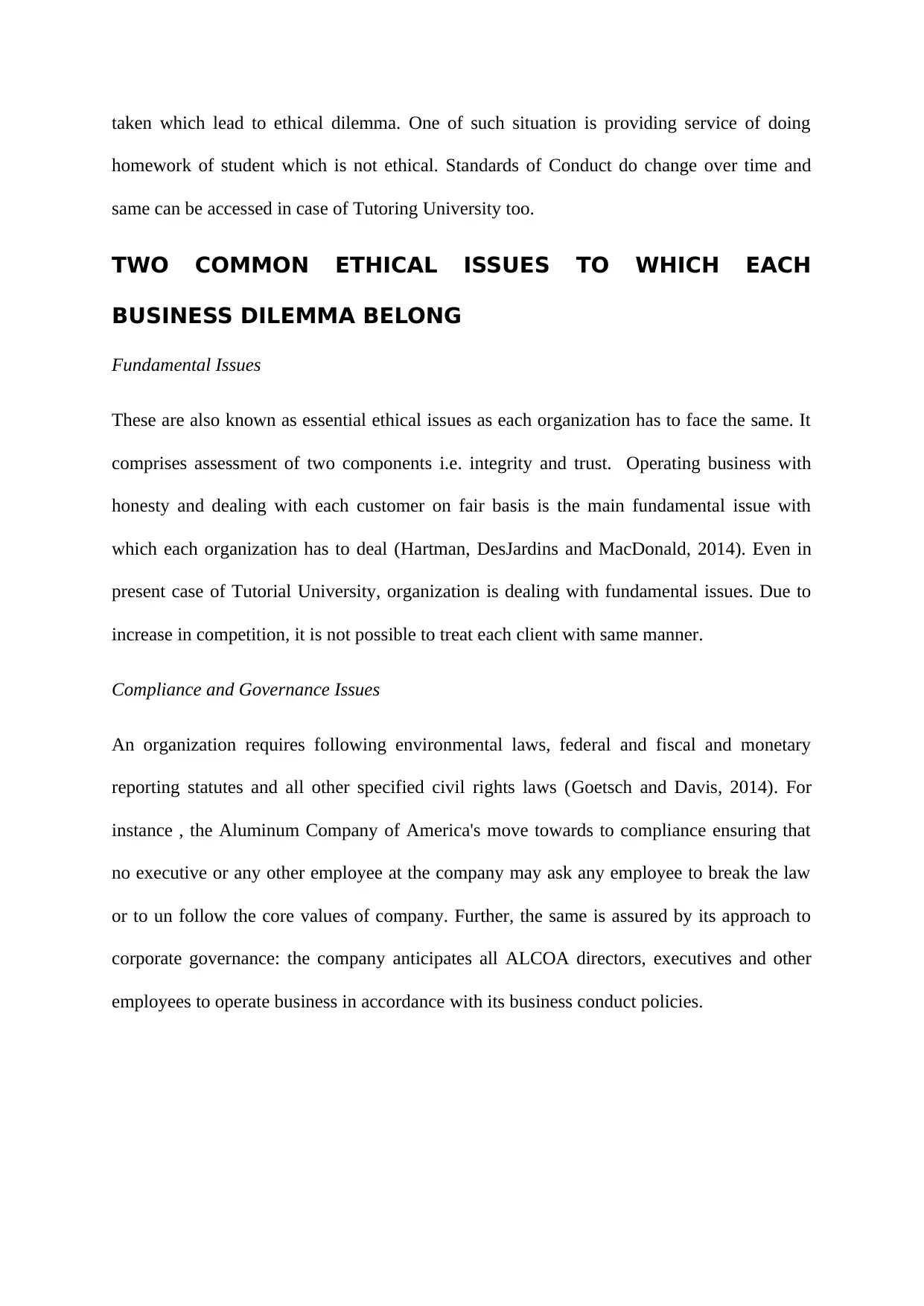
taken which lead to ethical dilemma. One of such situation is providing service of doing
homework of student which is not ethical. Standards of Conduct do change over time and
same can be accessed in case of Tutoring University too.
TWO COMMON ETHICAL ISSUES TO WHICH EACH
BUSINESS DILEMMA BELONG
Fundamental Issues
These are also known as essential ethical issues as each organization has to face the same. It
comprises assessment of two components i.e. integrity and trust. Operating business with
honesty and dealing with each customer on fair basis is the main fundamental issue with
which each organization has to deal (Hartman, DesJardins and MacDonald, 2014). Even in
present case of Tutorial University, organization is dealing with fundamental issues. Due to
increase in competition, it is not possible to treat each client with same manner.
Compliance and Governance Issues
An organization requires following environmental laws, federal and fiscal and monetary
reporting statutes and all other specified civil rights laws (Goetsch and Davis, 2014). For
instance , the Aluminum Company of America's move towards to compliance ensuring that
no executive or any other employee at the company may ask any employee to break the law
or to un follow the core values of company. Further, the same is assured by its approach to
corporate governance: the company anticipates all ALCOA directors, executives and other
employees to operate business in accordance with its business conduct policies.
homework of student which is not ethical. Standards of Conduct do change over time and
same can be accessed in case of Tutoring University too.
TWO COMMON ETHICAL ISSUES TO WHICH EACH
BUSINESS DILEMMA BELONG
Fundamental Issues
These are also known as essential ethical issues as each organization has to face the same. It
comprises assessment of two components i.e. integrity and trust. Operating business with
honesty and dealing with each customer on fair basis is the main fundamental issue with
which each organization has to deal (Hartman, DesJardins and MacDonald, 2014). Even in
present case of Tutorial University, organization is dealing with fundamental issues. Due to
increase in competition, it is not possible to treat each client with same manner.
Compliance and Governance Issues
An organization requires following environmental laws, federal and fiscal and monetary
reporting statutes and all other specified civil rights laws (Goetsch and Davis, 2014). For
instance , the Aluminum Company of America's move towards to compliance ensuring that
no executive or any other employee at the company may ask any employee to break the law
or to un follow the core values of company. Further, the same is assured by its approach to
corporate governance: the company anticipates all ALCOA directors, executives and other
employees to operate business in accordance with its business conduct policies.
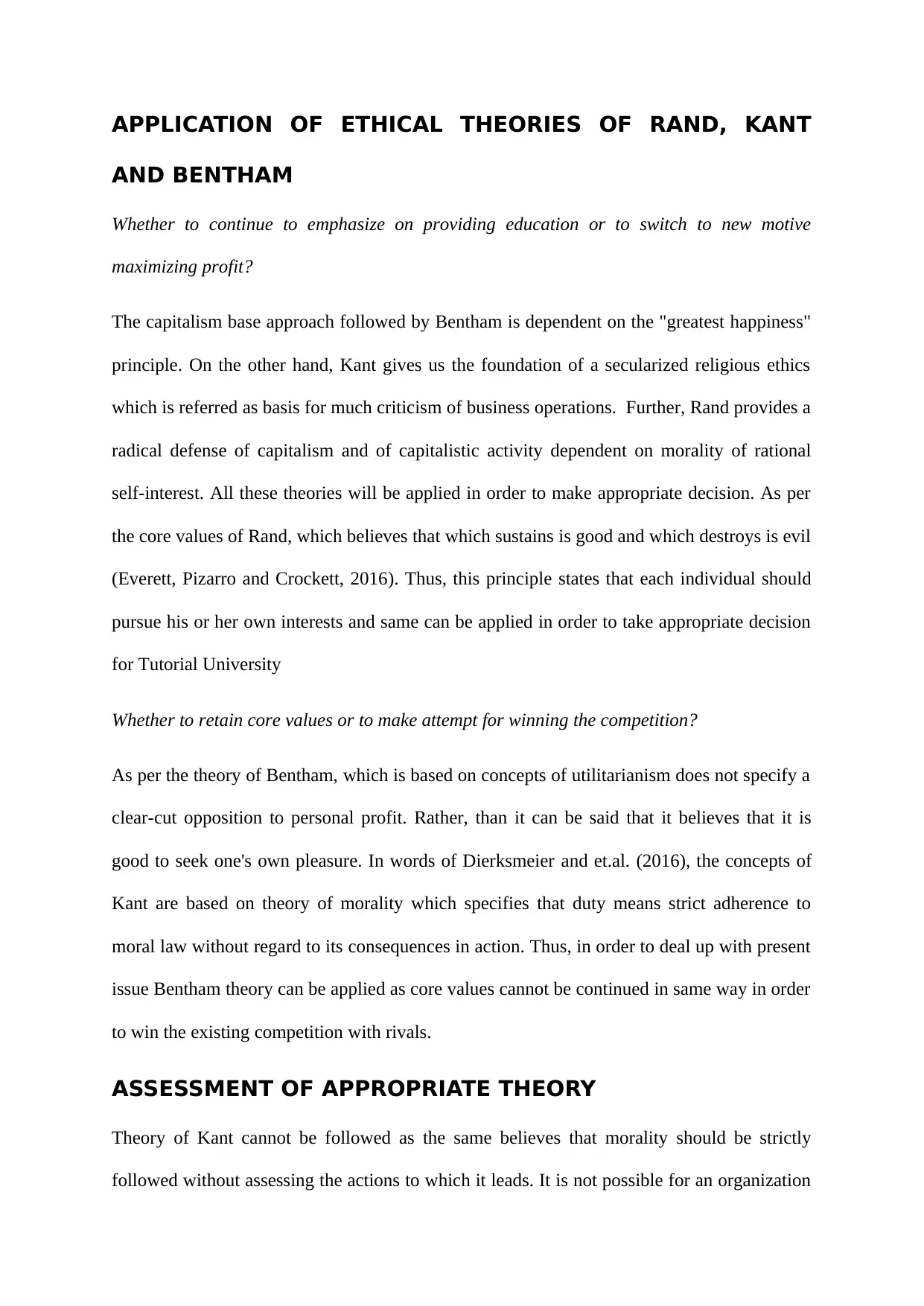
APPLICATION OF ETHICAL THEORIES OF RAND, KANT
AND BENTHAM
Whether to continue to emphasize on providing education or to switch to new motive
maximizing profit?
The capitalism base approach followed by Bentham is dependent on the "greatest happiness"
principle. On the other hand, Kant gives us the foundation of a secularized religious ethics
which is referred as basis for much criticism of business operations. Further, Rand provides a
radical defense of capitalism and of capitalistic activity dependent on morality of rational
self-interest. All these theories will be applied in order to make appropriate decision. As per
the core values of Rand, which believes that which sustains is good and which destroys is evil
(Everett, Pizarro and Crockett, 2016). Thus, this principle states that each individual should
pursue his or her own interests and same can be applied in order to take appropriate decision
for Tutorial University
Whether to retain core values or to make attempt for winning the competition?
As per the theory of Bentham, which is based on concepts of utilitarianism does not specify a
clear-cut opposition to personal profit. Rather, than it can be said that it believes that it is
good to seek one's own pleasure. In words of Dierksmeier and et.al. (2016), the concepts of
Kant are based on theory of morality which specifies that duty means strict adherence to
moral law without regard to its consequences in action. Thus, in order to deal up with present
issue Bentham theory can be applied as core values cannot be continued in same way in order
to win the existing competition with rivals.
ASSESSMENT OF APPROPRIATE THEORY
Theory of Kant cannot be followed as the same believes that morality should be strictly
followed without assessing the actions to which it leads. It is not possible for an organization
AND BENTHAM
Whether to continue to emphasize on providing education or to switch to new motive
maximizing profit?
The capitalism base approach followed by Bentham is dependent on the "greatest happiness"
principle. On the other hand, Kant gives us the foundation of a secularized religious ethics
which is referred as basis for much criticism of business operations. Further, Rand provides a
radical defense of capitalism and of capitalistic activity dependent on morality of rational
self-interest. All these theories will be applied in order to make appropriate decision. As per
the core values of Rand, which believes that which sustains is good and which destroys is evil
(Everett, Pizarro and Crockett, 2016). Thus, this principle states that each individual should
pursue his or her own interests and same can be applied in order to take appropriate decision
for Tutorial University
Whether to retain core values or to make attempt for winning the competition?
As per the theory of Bentham, which is based on concepts of utilitarianism does not specify a
clear-cut opposition to personal profit. Rather, than it can be said that it believes that it is
good to seek one's own pleasure. In words of Dierksmeier and et.al. (2016), the concepts of
Kant are based on theory of morality which specifies that duty means strict adherence to
moral law without regard to its consequences in action. Thus, in order to deal up with present
issue Bentham theory can be applied as core values cannot be continued in same way in order
to win the existing competition with rivals.
ASSESSMENT OF APPROPRIATE THEORY
Theory of Kant cannot be followed as the same believes that morality should be strictly
followed without assessing the actions to which it leads. It is not possible for an organization
⊘ This is a preview!⊘
Do you want full access?
Subscribe today to unlock all pages.

Trusted by 1+ million students worldwide
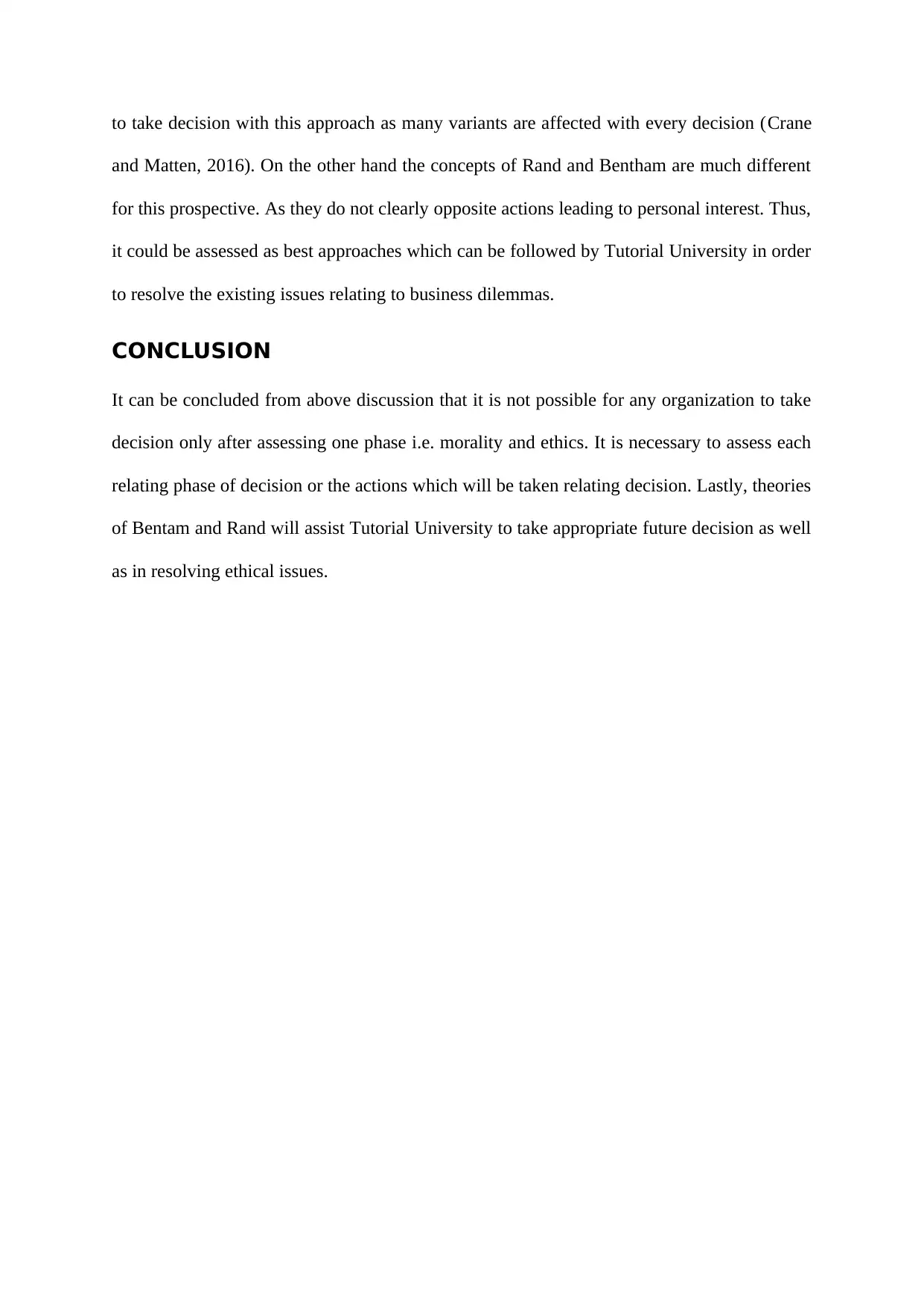
to take decision with this approach as many variants are affected with every decision (Crane
and Matten, 2016). On the other hand the concepts of Rand and Bentham are much different
for this prospective. As they do not clearly opposite actions leading to personal interest. Thus,
it could be assessed as best approaches which can be followed by Tutorial University in order
to resolve the existing issues relating to business dilemmas.
CONCLUSION
It can be concluded from above discussion that it is not possible for any organization to take
decision only after assessing one phase i.e. morality and ethics. It is necessary to assess each
relating phase of decision or the actions which will be taken relating decision. Lastly, theories
of Bentam and Rand will assist Tutorial University to take appropriate future decision as well
as in resolving ethical issues.
and Matten, 2016). On the other hand the concepts of Rand and Bentham are much different
for this prospective. As they do not clearly opposite actions leading to personal interest. Thus,
it could be assessed as best approaches which can be followed by Tutorial University in order
to resolve the existing issues relating to business dilemmas.
CONCLUSION
It can be concluded from above discussion that it is not possible for any organization to take
decision only after assessing one phase i.e. morality and ethics. It is necessary to assess each
relating phase of decision or the actions which will be taken relating decision. Lastly, theories
of Bentam and Rand will assist Tutorial University to take appropriate future decision as well
as in resolving ethical issues.
Paraphrase This Document
Need a fresh take? Get an instant paraphrase of this document with our AI Paraphraser
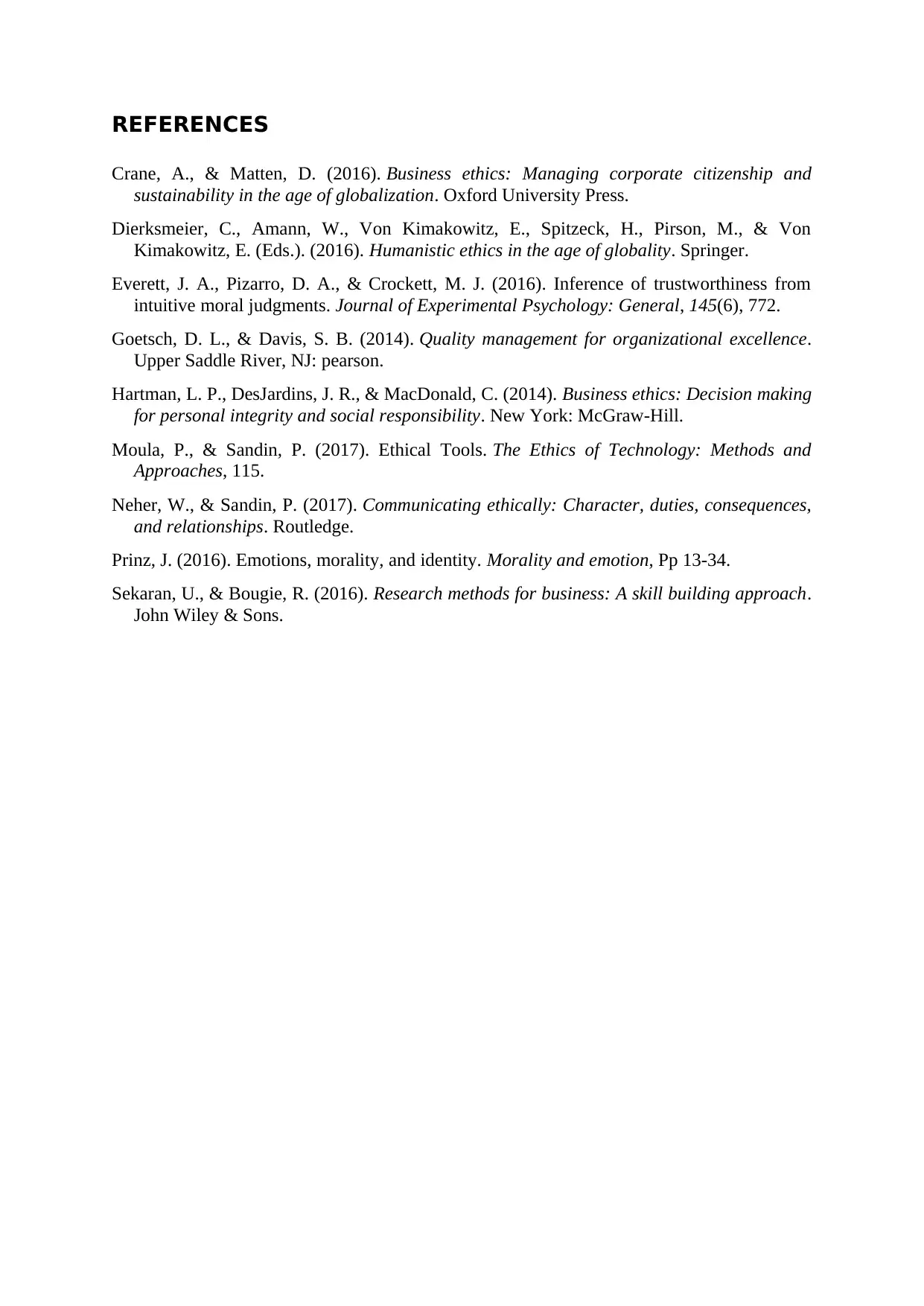
REFERENCES
Crane, A., & Matten, D. (2016). Business ethics: Managing corporate citizenship and
sustainability in the age of globalization. Oxford University Press.
Dierksmeier, C., Amann, W., Von Kimakowitz, E., Spitzeck, H., Pirson, M., & Von
Kimakowitz, E. (Eds.). (2016). Humanistic ethics in the age of globality. Springer.
Everett, J. A., Pizarro, D. A., & Crockett, M. J. (2016). Inference of trustworthiness from
intuitive moral judgments. Journal of Experimental Psychology: General, 145(6), 772.
Goetsch, D. L., & Davis, S. B. (2014). Quality management for organizational excellence.
Upper Saddle River, NJ: pearson.
Hartman, L. P., DesJardins, J. R., & MacDonald, C. (2014). Business ethics: Decision making
for personal integrity and social responsibility. New York: McGraw-Hill.
Moula, P., & Sandin, P. (2017). Ethical Tools. The Ethics of Technology: Methods and
Approaches, 115.
Neher, W., & Sandin, P. (2017). Communicating ethically: Character, duties, consequences,
and relationships. Routledge.
Prinz, J. (2016). Emotions, morality, and identity. Morality and emotion, Pp 13-34.
Sekaran, U., & Bougie, R. (2016). Research methods for business: A skill building approach.
John Wiley & Sons.
Crane, A., & Matten, D. (2016). Business ethics: Managing corporate citizenship and
sustainability in the age of globalization. Oxford University Press.
Dierksmeier, C., Amann, W., Von Kimakowitz, E., Spitzeck, H., Pirson, M., & Von
Kimakowitz, E. (Eds.). (2016). Humanistic ethics in the age of globality. Springer.
Everett, J. A., Pizarro, D. A., & Crockett, M. J. (2016). Inference of trustworthiness from
intuitive moral judgments. Journal of Experimental Psychology: General, 145(6), 772.
Goetsch, D. L., & Davis, S. B. (2014). Quality management for organizational excellence.
Upper Saddle River, NJ: pearson.
Hartman, L. P., DesJardins, J. R., & MacDonald, C. (2014). Business ethics: Decision making
for personal integrity and social responsibility. New York: McGraw-Hill.
Moula, P., & Sandin, P. (2017). Ethical Tools. The Ethics of Technology: Methods and
Approaches, 115.
Neher, W., & Sandin, P. (2017). Communicating ethically: Character, duties, consequences,
and relationships. Routledge.
Prinz, J. (2016). Emotions, morality, and identity. Morality and emotion, Pp 13-34.
Sekaran, U., & Bougie, R. (2016). Research methods for business: A skill building approach.
John Wiley & Sons.
1 out of 8
Related Documents
Your All-in-One AI-Powered Toolkit for Academic Success.
+13062052269
info@desklib.com
Available 24*7 on WhatsApp / Email
![[object Object]](/_next/static/media/star-bottom.7253800d.svg)
Unlock your academic potential
Copyright © 2020–2026 A2Z Services. All Rights Reserved. Developed and managed by ZUCOL.





